Bio 399. Deep Time Biology (Fall 2012) Course Information
advertisement
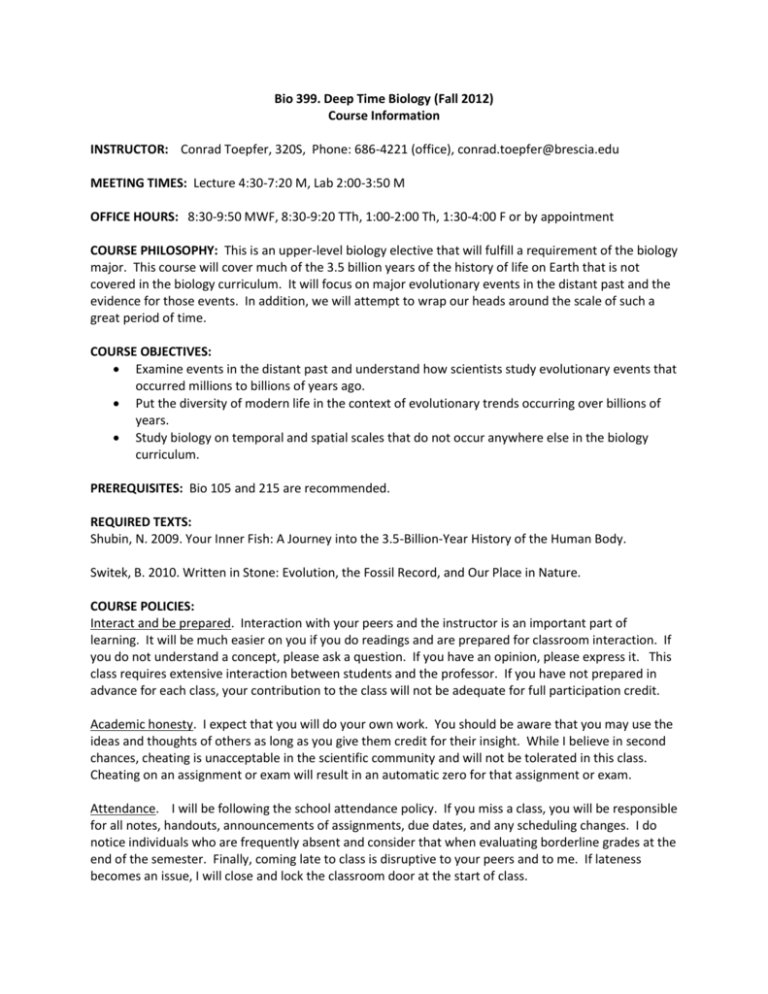
Bio 399. Deep Time Biology (Fall 2012) Course Information INSTRUCTOR: Conrad Toepfer, 320S, Phone: 686-4221 (office), conrad.toepfer@brescia.edu MEETING TIMES: Lecture 4:30-7:20 M, Lab 2:00-3:50 M OFFICE HOURS: 8:30-9:50 MWF, 8:30-9:20 TTh, 1:00-2:00 Th, 1:30-4:00 F or by appointment COURSE PHILOSOPHY: This is an upper-level biology elective that will fulfill a requirement of the biology major. This course will cover much of the 3.5 billion years of the history of life on Earth that is not covered in the biology curriculum. It will focus on major evolutionary events in the distant past and the evidence for those events. In addition, we will attempt to wrap our heads around the scale of such a great period of time. COURSE OBJECTIVES: Examine events in the distant past and understand how scientists study evolutionary events that occurred millions to billions of years ago. Put the diversity of modern life in the context of evolutionary trends occurring over billions of years. Study biology on temporal and spatial scales that do not occur anywhere else in the biology curriculum. PREREQUISITES: Bio 105 and 215 are recommended. REQUIRED TEXTS: Shubin, N. 2009. Your Inner Fish: A Journey into the 3.5-Billion-Year History of the Human Body. Switek, B. 2010. Written in Stone: Evolution, the Fossil Record, and Our Place in Nature. COURSE POLICIES: Interact and be prepared. Interaction with your peers and the instructor is an important part of learning. It will be much easier on you if you do readings and are prepared for classroom interaction. If you do not understand a concept, please ask a question. If you have an opinion, please express it. This class requires extensive interaction between students and the professor. If you have not prepared in advance for each class, your contribution to the class will not be adequate for full participation credit. Academic honesty. I expect that you will do your own work. You should be aware that you may use the ideas and thoughts of others as long as you give them credit for their insight. While I believe in second chances, cheating is unacceptable in the scientific community and will not be tolerated in this class. Cheating on an assignment or exam will result in an automatic zero for that assignment or exam. Attendance. I will be following the school attendance policy. If you miss a class, you will be responsible for all notes, handouts, announcements of assignments, due dates, and any scheduling changes. I do notice individuals who are frequently absent and consider that when evaluating borderline grades at the end of the semester. Finally, coming late to class is disruptive to your peers and to me. If lateness becomes an issue, I will close and lock the classroom door at the start of class. Assignments. I expect you to complete the assignments by the due date. Work to be turned in will be collected at the beginning of lecture. Late work will be penalized 20% per day until it is received. This penalty will be assessed starting one hour after the class period in which an assignment was due. If you disagree with a grade that has been given, you have one week after the assignment was returned to the class to discuss your grade with the instructor. Disability. Reasonable accommodations are available for students with a documented disability. If you have a documented disability and may need accommodations to participate fully in this course, please contact Dr. Dolores Kiesler (Office 254 on the second floor of the Administration Building.) All academic accommodations must be approved through her office. Please stop by or call 270-686-4259 to make an appointment. ASSIGNMENTS: Lecture Tests. The lecture will include a midterm and a final. Given the “big picture” nature of the content for this course, both tests will be take-home tests. You will be expected to integrate material from our discussions and your own research into your responses. You may discuss your ideas but the final, written answers must be your own work. Presentation. You will select a deep-time topic that we are not covering as a class and develop a presentation for the topic. While it is expected that you will be the resident “expert” for that topic, I expect you to involve your peers. You may have a PowerPoint but should do more than just talk at your audience. Your presentation must involve a discussion of primary literature, a lab-type activity, or some other form of interaction. You should plan for being responsible for approximately one hour of class time. Thread topic. We will be participating in the cancer thread in multiple courses again this year. You will be required to attend a Friday symposium at 1:00 p.m. on Friday, November 30th. You will also have an assignment to complete after the symposium. Participation. Nearly the entire course will involve a discussion of primary literature. You are expected to participate actively in the discussion. Lab Lab reports. Most labs will have a handout with questions. You may turn handouts in the following week or save them in a journal to turn in at the end of the semester. I would recommend you also use your journal to reflect on field trips. We will be covering material that is not in any other course in the curriculum. You may want to remember some of the content. Participation. It may be tempting given the structure of this course to view it as just some interesting stuff once a week. You are expected to fully participate in every activity with the barest minimum of whining. In addition, as part of a class field trips, you are representing Brescia University. Any behavioral issues such as intoxication will negatively affect your participation grade. SUMMARY OF GRADING: Lecture Exams (2 @ 100) Presentation Bacteria thread Participation Total 200 100 75 200 575 Lab Reports Participation Total 400 100 575 GRADING SCALE: A: 90-100% B: 80-89% C: 70-79% D: 60-69% F: <60% Note: I reserve the right to change the number or structure of assignments or the total number of points assigned during the semester. Any changes will be announced in class and/or on handouts. Tentative Schedule Date 8/27 Topic Deep Time—How Long is That?, Radiometric Dating; Lab: Geologic Time Scale 9/3 No class, Labor Day 9/7-8 Trip to Chicago Field Museum (time trade for 9/3 class) 9/10 Plate tectonics, Basic geology; Lab: Mineral Identification 9/17 Fossils and Fossil Record; Lab: Fossil Identification and Dating Readings: Donoghue, P.C.J. and M.A. Purnell. 2009. Distinguishing heat from light in debate over controversial fossils. BioEssays 31: 178-189. Kidwell, S.M. and S.M. Holland. 2002. The quality of the fossil record: implications for evolutionary analyses. Annual Review of Ecology and Systematics 33: 561-588. Switek, B. 2010. Written in Stone—Read “Living Rock” and “Moving Mountains” chapters 9/24 Classic Transitions: Whale Evolution, Eye Evolution; Lab: TBA Readings: Nilsson, D-E. 2004. Eye evolution: a question of genetic promiscuity. Current Opinion in Neurobiology. 14: 407-414. Oakley, T.H. 2003. The eye as a replicating and diverging, modular developmental unit. Trends in Ecology and Evolution 18(12): 623-627. Shubin, N. 2008. Your Inner Fish—Read Chapter 8, “Vision” Switek, B. 2010 Written in Stone—Read “As Monstrous as a Whale” chapter Uhen, M.D. 2010. The origin(s) of whales. Annual Review Earth and Planetary Sciences. 38: 189219. 9/29 Trip to Centre College fossil collection (time trade for 10/22 class) 10/1 Transitions: Water to Land, Land to Air; Lab: TBA Readings: Coates, M.I., J.E. Jeffery, and M. Ruta. 2002. Fins to limbs: what the fossils say. Evolution & Development 4(5): 390-401. Shubin, N., C. Tabin, and S. Carroll. 1997. Fossils, genes and the evolution of animal limbs. Nature 388: 639-648 Switek, B. 2010. Written in Stone—Read “Fins to Fingers” and “Footprints and Feathers” 10/8 Extinctions Readings: Benton, M.J. and R.J. Twitchett. 2003. How to kill (almost)all life: the end-Permian extinction event. Trends in Ecology and Evolution 18(7): 358-365. Erwin, D.H. 2008. Extinction as the loss of evolutionary history. PNAS 105(Suppl. 1): 1152011527. 10/15 Molecular clocks; Lab: Molecular cladistics Readings: Donoghue, P.C.J. and M.J. Benton. 2007. Rocks and clocks: calibrating the tree of life using fossils and molecules. Trends in Ecology and Evolution 22(8): 424-431. 10/22 No class, Fall Break 10/29 Hominid Evolution; Lab: Hominid skull phylogeny Readings: Dunsworth, H.M. 2010. Origin of the genus Homo. Evolution Education Outreach 3: 353-366. Havarti, K. 2010. Neanderthals. Evolution Education Outreach. 3: 367-376. Strait, D.S. 2010. The evolutionary history of the Australopiths. Evolution Education Outreach 3: 341-352. Switek, B. 2010. Written in Stone—Read “Through the Looking Glass” chapter 11/5 Ancient disease; Lab: TBA Readings: Davies, P.C.W. and C.H. Lineweaver. 2011. Cancer tumors as metazoan 1.0: tapping genes of ancient ancestors. Physical Biology 8: 1-7. Domazet-Lošo, T. and D. Tautz. 2010. Phylostratigraphic tracking of cancer genes suggests a link to the emergence of multicellularity in metazoan. BMC Biology 8: 66-75. Moyes, D., D.J. Griffiths, and P.J. Venables. 2007. Insertional polymorphisms: a new lease of life for endogenous retroviruses in human disease. 11/12 Evolutionary development; Lab: TBA Readings: Carroll, S.B. 2005. Evolution at two levels: on genes and form. PLoS Biology 3(7): 1159-1166 Koentges, G. 2008. Evolution of anatomy and gene control. Nature 451: 658-663. 11/19 Evolutionary development Readings: Peterson, K.J., M.A. McPeek, and D.A.D. Evans. 2005. Tempo and mode of early animal evolution: inferences from rocks, Hox, and molecular clocks. 11/26 Student presentations 12/3 Student presentations
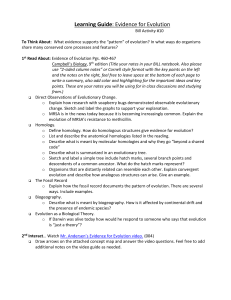

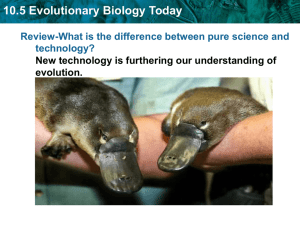
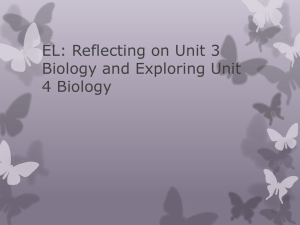
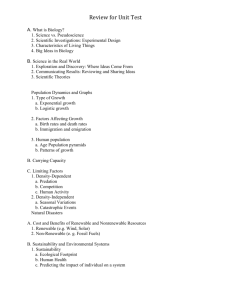
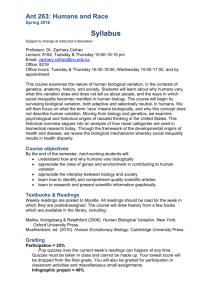
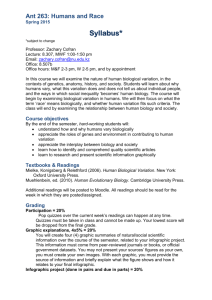

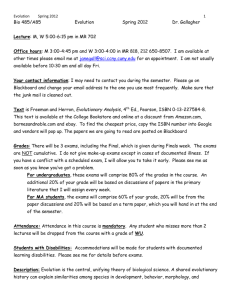
![INSDSG-[course number] - Syllabus- [Course Title]](http://s3.studylib.net/store/data/006726028_1-798a15073427028f29212ca84bd4f778-300x300.png)